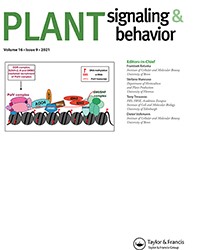Ver ítem
- xmlui.general.dspace_homeCentros e Institutos de InvestigaciónCIAP. Centro de Investigaciones AgropecuariasInstituto de Fisiología y Recursos Genéticos VegetalesArtículos científicosxmlui.ArtifactBrowser.ItemViewer.trail
- Inicio
- Centros e Institutos de Investigación
- CIAP. Centro de Investigaciones Agropecuarias
- Instituto de Fisiología y Recursos Genéticos Vegetales
- Artículos científicos
- Ver ítem
A proposed role for endomembrane trafficking processes in regulating tonoplast content and vacuole dynamics under ammonium stress conditions in Arabidopsis root cells
Resumen
Ammonium (NH4+) stress has multiple effects on plant physiology, therefore, plant responses are complex, and multiple mechanisms are involved in NH4+ sensitivity and tolerance in plants. Root growth inhibition is an important quantitative readout of the effects of NH4+ stress on plant physiology, and cell elongation appear as the principal growth inhibition target. We recently proposed autophagy as a relevant physiological mechanisms underlying NH4+
[ver mas...]
Ammonium (NH4+) stress has multiple effects on plant physiology, therefore, plant responses are complex, and multiple mechanisms are involved in NH4+ sensitivity and tolerance in plants. Root growth inhibition is an important quantitative readout of the effects of NH4+ stress on plant physiology, and cell elongation appear as the principal growth inhibition target. We recently proposed autophagy as a relevant physiological mechanisms underlying NH4+ sensitivity response in Arabidopsis. In a brief overview, the impaired macro-autophagic flux observed under NH4+ stress conditions has a detrimental impact on the cellular energetic balance, and therefore on the energy-demanding plant growth. In contrast to its inhibitory effect on the autophagosomes flux to vacuole, NH4+ toxicity induced a micro-autophagy-like process. Consistent with the reduced membrane flux to the vacuole related to macro-autophagy inhibition and the increased tonoplast degradation due to enhanced micro-autophagy, the vacuoles of the root cells of the NH4+-stressed plants showed lower tonoplast content and a decreased perimeter/area ratio. As the endosome-to-vacuole trafficking is another important process that contributes to membrane flux toward the vacuole, we evaluated the effects of NH4+ stress on this process. This allows us to propose that autophagy could contribute to vacuole development as well as possible avenues to follow for future studies.
[Cerrar]

Autor
Robert, German;
Yagyu, Mako;
Lascano, Hernan Ramiro;
Masclaux-Daubresse, Céline;
Yoshimoto, Kohki;
Fuente
Plant Signaling & Behavior 16 (9): e1924977 (2021)
Fecha
2021-05-06
Editorial
Taylor and Francis
ISSN
1559-2316
1559-2324 (online)
1559-2324 (online)
Documentos Relacionados
Formato
pdf
Tipo de documento
artículo
Proyectos
(ver más)
INTA/2019-PD-E6-I116-001/2019-PD-E6-I116-001/AR./Identificación y análisis funcional de genes o redes génicas de interés biotecnológico con fin agropecuario, forestal, agroalimentario y/o agroindustrial.
Palabras Claves
Derechos de acceso
Restringido
 Excepto donde se diga explicitamente, este item se publica bajo la siguiente descripción: Creative Commons Attribution-NonCommercial-ShareAlike 2.5 Unported (CC BY-NC-SA 2.5)
Excepto donde se diga explicitamente, este item se publica bajo la siguiente descripción: Creative Commons Attribution-NonCommercial-ShareAlike 2.5 Unported (CC BY-NC-SA 2.5)

